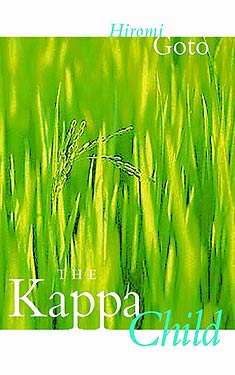Hiromi Goto
Completed 9/24/2016 Reviewed 9/25/2016
4 stars
I’ve never read any of the “Little House on the Prairie”
books but I understand the general gist from having seen a few episodes of the
TV series back in my youth. They
represent a child’s view growing up in prairie homesteading days written for
children. The main, unnamed character of
“The Kappa Child” is a bit obsessed with the book. So when her Canadian family of Japanese
descent moves from the lush metropolitan Vancouver, BC to the Canadian prairie,
of course she’s going to compare and refer a lot to her favorite book. But the worlds couldn’t be any more
different, with her father’s dream of growing rice rather than something that
would actually flourish. And her father
is abusive to the children and the mother.
 The book takes place in the present of the adult protagonist
with flashbacks to her childhood moving to the farm. In the present, she encounters a Kappa, a
green water sprite, part frog, part turtle, part human. But rather than real traditional fantasy, the
encounter has more of a magical realism quality. The encounter, which involves sumo wrestling
as Kappas are prone to engage in, leaves the protagonist supernaturally
pregnant. So she must deal with her
unbelievable, undetectable pregnancy, the pain of her childhood past, and her
not-so-great present relationships.
The book takes place in the present of the adult protagonist
with flashbacks to her childhood moving to the farm. In the present, she encounters a Kappa, a
green water sprite, part frog, part turtle, part human. But rather than real traditional fantasy, the
encounter has more of a magical realism quality. The encounter, which involves sumo wrestling
as Kappas are prone to engage in, leaves the protagonist supernaturally
pregnant. So she must deal with her
unbelievable, undetectable pregnancy, the pain of her childhood past, and her
not-so-great present relationships.
I realize the summary of the book is somewhat confusing, but
the book reflects that. The narrator,
our protagonist, is an unreliable narrator, often not realizing the reality of
what’s going on around her. She has
incredibly low self-esteem, and not so great relationships with her sisters and
friends. So the view we get of her life
is skewed toward the negative. But
that’s not to say that the book is a confusing downer. It is in fact a pretty good read where the
jumps between the past and present are actually very easy to follow.
What’s most confusing is the Kappa aspect. At the end of the book, the author fully
explains what a Kappa is from Japanese mythology. It left me wondering about the significance
of the main character being pregnant with a Kappa child. Is that what I was supposed to be getting out
of it? Or perhaps, she herself is the Kappa child.
Even though I couldn’t quite figure this out, I really
enjoyed the book. The narrator has a
very interesting perspective on her life.
It makes the book very readable.
I give the book four out of five stars.
No comments:
Post a Comment